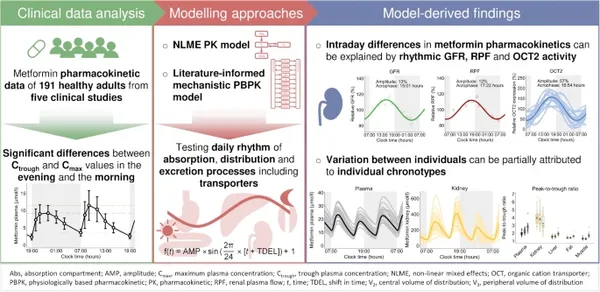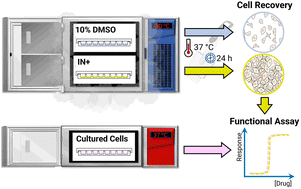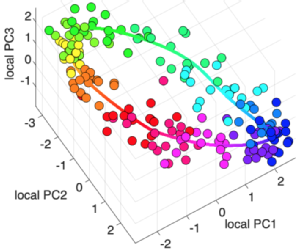Publications
A complete up-to-date list of publications of Robert can be found on Google Scholar and full-texts might be available from the Warwick Research Active Portal (WRAP).
Adenosine Kinase regulates Sleep Timing and the Homeostatic Sleep Response through Distinct Molecular Pathways
A follow up on the actions of adenosine kinase in collaboration with Aarti Jagannath's group.
Sleep behaviour is broadly regulated by two drives, the circadian (Process C), which is orchestrated by the suprachiasmatic nuclei (SCN), and controls sleep timing, and the homeostatic (Process S), which controls sleep amount and the response to sleep deprivation (Borbély et al., 2016). However, the molecular pathways that mediate their independent effects, and their interactions remain unclear. Adenosine is an important integrator of both processes (Bjorness & Greene, 2009; Jagannath et al., 2021, 2022), such that adenosine levels track and modulate wakefulness, whilst adenosine signalling inhibits the circadian response to light. Therefore, we studied the sleep/circadian behaviour, and cortical and SCN transcriptomic profiles of a mouse model overexpressing Adenosine Kinase (Adk-Tg) (Fedele et al., 2005), (Palchykova et al., 2010). We found that overall, the Adk-Tg mouse slept less and showed lower amplitude circadian rhythms with an altered sleep/wake distribution across the 24h day, which correlated with changes in transcription of synaptic signalling genes that would shift the excitatory/inhibitory balance. In addition, the Adk-Tg mouse showed a reduced level of ERK phosphorylation, and attenuation of DNA repair related pathways. After sleep deprivation, however, the Adk-Tg mouse significantly increased relative to wildtype, immediate early gene expression levels including of Arc, but paradoxically reduced ERK phosphorylation. Thus, baseline sleep levels and timing are regulated by ERK signalling, whereas the response to sleep loss is mediated by the alteration of the transcriptomic landscape independently of ERK.
How to unfreeze liver cells without killing them (just to later kill them with drugs)?
This is a real issue in drug screening, especially high throughput assays are suffering from low viability after thawing of cells, and associate labour-intensive remidies. To address this, we helped the Gibson Group to show off their impressive anti-freeze technique in a paper entitled: "Cryopreservation of Assay-Ready Hepatocyte Monolayers by Chemically-Induced Ice Nucleation: Preservation of Hepatic Function and Hepatotoxicity Screening Capabilities"
Being able to recover many HepG2 cells as well as primary hepotocytes as we demonstrate in this paper is a step in the direction to make this process more efficient and reducing variation!
Metformin pharmacokinetics are modulated by the patients indiviual chronotype
Treatment at the optimal time-of-day shows benefits for patients in various indications from cancer to diabetes mellitus, although for example in type 2 diabetes this has not been investigated in dedicated clinical trials. Here, we use a modelling approach to ask if metformin pharmacokinetics exhibit significant variation depending on time of application, and then predict and test what the underlying causes might be.
Analysis of clinical data from a large dataset revealed significant intraday variation of metformin pharmacokinetics. Empirical and mechanistic pharmacokinetic modelling showed that variation in pharmacokinetics could be attributed to rhythms in glomerular filtration rate, renal plasma flow and organic cation transporter 2 activity. Also, and importantly, interindividual variation was partly explained by individual “chronotype”. This suggests that not only do metformin pharmacokinetics show pronounced time-of-day dependent differences, but also interindividual variability based on chronotype might impact metformin efficacy and present opportunities for future optimised chronomodulated therapy of type 2 diabetes patients.

TimeTeller: a tool to probe the circadian clock as a multigene dynamical system
|
|
Great collaboration started by David Rand and Francis Lévi with contributions from many including MRC DTP PhD students Laura Usselmann and Vadim Vasilyev, we describe a novel tool to interrogate the circadian clock from a single sample's transcriptome. We show in many examples how this can deliver useful information not only on the phase of the biological clock in the sample, but also give an estimate on the functionality of the clock. Furthermore, we show how this has potential as a biomarker to stratify data-sets from human tissues as well as inform research in experimental models. The TimeTeller algorithm will be available for use to any interested colleague soon. |
Flow Rate Independent Multiscale Liquid Biopsy for Precision Oncology
Previously as a preprint (arXiveLink opens in a new window), now peer-reviewed out in ACS Sensors. A collaboration led bt Jérôme Charmet and Holosensor Medical Technology Ltd. introducing a new flow rate independent way to trap and then process circulating tumour cells. One stop shop from engineering of the device including simulating the flow conditions to making and testing as proof of principle and then application in a clinical data-set.



